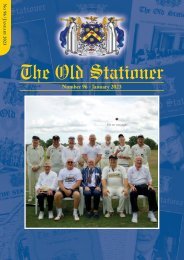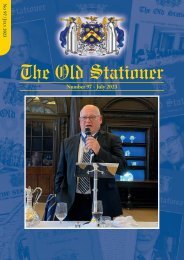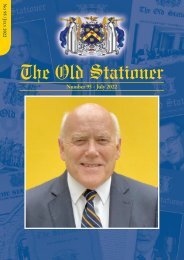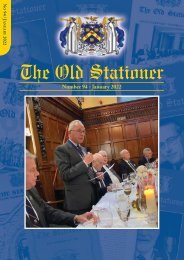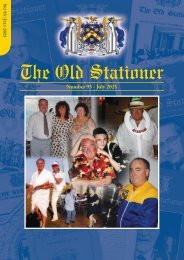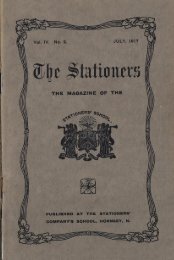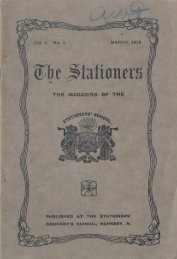You also want an ePaper? Increase the reach of your titles
YUMPU automatically turns print PDFs into web optimized ePapers that Google loves.
T h e O l d S t a t i o n e r - N o 7 8<br />
A TuRNiNG PoiNT<br />
City New Year Service -St Michae1, Cornhill<br />
Friday 10 January 2014<br />
On this very day, in the year 1645, Archbishop William Laud,<br />
then Archbishop of Canterbury fell victim to the executioner.<br />
Laud was a complex and intelligent man but no politician, and<br />
only four years later -not quite to the day -his Sovereign, King<br />
Charles I would lose his head to the axe man, on a scaffold<br />
outside the royal palace in Whitehall. It was the culmination of<br />
seven years of bloody war between King and Parliament,<br />
between Cavalier and Roundhead, between Charles and<br />
Cromwell. Laud's death on this day in 1645 was a turning point.<br />
This New Year will be but the beginning of five years of<br />
commemorations of an even more ugly and brutal war. But I<br />
would like to take to you back to a slightly less distant war<br />
recalling an event which again came right at the year's end. On<br />
the night of December 29th 1940, Tom Deakin, Edith Cooper<br />
and her son George, emerged from a blazing building. It was the<br />
headquarters of the Cellular Clothing Company which used to<br />
make Aertex shirts, sportswear, blankets and all the rest. These<br />
three had been on fire watch at the Aertex building on the corner<br />
of Fore Street and Moor Lane, in what we now call the Barbican.<br />
Tom said to Edith, his sister-in-law, "Come -let's go down<br />
here," pointing to the right. Edith, as if by instinct, said, "No<br />
we'll go left." Seconds after they moved away, immediately<br />
behind them, a blazing building fell into the street. It was a<br />
miraculous escape, and it was a turning point.<br />
Edith was my grandmother, Tom my great-uncle and George<br />
my father. Well into my childhood, looking out from a pockmarked<br />
Moorgate Station towards St Paul's Cathedral, all that<br />
could be seen were ruined basements with weeds and scrub<br />
growing amongst them. Recalling my father telling that tale<br />
always makes the City of London somehow assume an even<br />
greater significance for me than it would have anyway. In so<br />
many ways that story, that place and that event (in the midst of<br />
what is often described as the second Great Fire of London)<br />
seems to have been a true turning point. Indeed without my<br />
grandmother's instinct I should not be here at all! There were, of<br />
course, many turning points in Hitler's war. Churchill famously<br />
remarked after the Battle of Britain had been won: 'This is not<br />
the end, it is not even the beginning of the end, but it is the end<br />
of the beginning.'<br />
Today's second reading from John's Gospel touches on just such<br />
a turning point. Yet, despite this, the story of Jesus turning the<br />
water into wine has almost become a cliche. You can imagine as<br />
a clergyman I've often been<br />
told: 'We need you to talk to<br />
your boss and stretch your<br />
hands over some water -this<br />
wine tastes like gnat's pee.'<br />
Clergy can themselves find<br />
the tale an embarrassment.<br />
One of my predecessors as<br />
curate tried to explain the<br />
miracle -or indeed explain it<br />
away. 'It was not,' he said,<br />
'that the water had been<br />
changed into wine but<br />
rather that the guests were<br />
so drunk that they couldn't<br />
tell water from wine.<br />
As you can imagine this<br />
caused uproar. The vicar<br />
sacked the curate and was<br />
then called in by the bishop<br />
to say he couldn't do that<br />
-he didn't employ him<br />
anyway! The director of<br />
training was brought in to<br />
explain modern biblical<br />
scholarship and biblical<br />
criticism -and so it went on.<br />
What was the curate's<br />
mistake? His mistake was to<br />
misunderstand the significance,<br />
the point of the<br />
story.<br />
What is the story about<br />
-why is it there? There are<br />
two tell-tale sentences (in<br />
what we heard) that give<br />
clues to what the miracle is<br />
about. They come at the<br />
29



